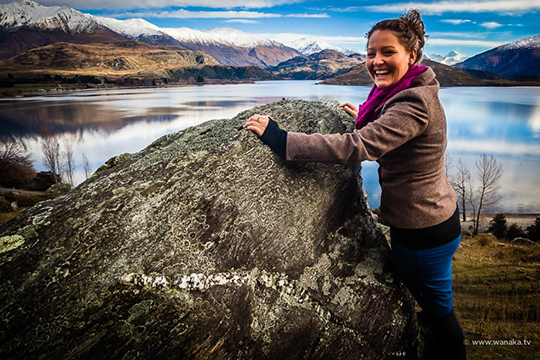Two titles in one year

Not many people finish their doctorate and get elected to their local council in the same year—but those are the double achievements for 2013 of Victoria University of Wellington graduate Ella Lawton.
Ella is graduating at the University’s December ceremonies with a PhD in Architecture, for which she researched ways of reducing New Zealand's ecological footprint, and in October she was elected to the Queenstown Lakes District Council (QLDC).
“It's been a busy year,” says Ella. “After finishing my PhD, I went away for a couple of months before starting my next big mission, which was campaigning for the local elections.”
At 31, she is one of the younger members of the Council.
Ella, who lives in Wanaka and works as a research manager and lecturer at Otago Polytechnic's Centre for Sustainable Practice, ran for Council because she wanted to see broader community representation around the table and to understand from the inside how the Council works.
“I wanted to show that here at the QLDC, it’s not just an old boys' game. More young people are being elected to the Council now—it’s great to see this movement.”
As a councillor for the Wanaka ward, one of the things Ella plans to explore is how to bring more sustainable practice into her community—the very topic of her thesis.
“There is a huge amount of information out there about sustainability but how to embed it in communities can be difficult to interpret. There is a role for council in showing people how to use this information to reduce their footprint.”
Her thesis, Footprinting New Zealand Urban Forms and Lifestyles, provides the theoretical background, footprint calculations and future scenarios required for The New Zealand Footprint Project, which is a collaboration between Victoria University, Otago Polytechnic and Auckland Council. The project explores the amount of land that is needed to support community infrastructure and lifestyles.
Ella was project manager for the south while her mother, Dr Maggie Lawton, was manager for the north. In their respective parts of the country, they gathered information about how resource accounting tools could be used to better understand the biggest opportunities each community has to reduce its footprint.
For her PhD research, Ella redesigned the original ecological footprint methodology, developed 22 years ago, and adapted it for use at a local level.
Her method provides a way to calculate the resources communities currently use, such as food and beverage, consumer goods, travel, holidays, citizenship, household energy and housing, and look at options for reducing use.
Food and beverage eats up the most resources says Ella, accounting for 57 percent of community need.
“This could easily be reduced. One of the options I’m looking at is how to localise food by better connecting producers with consumers and growing more food in our own back yards.”
Ella also plans to develop an ecological footprint calculator that businesses and community groups can use.
Image credit: Wanaka.tv
